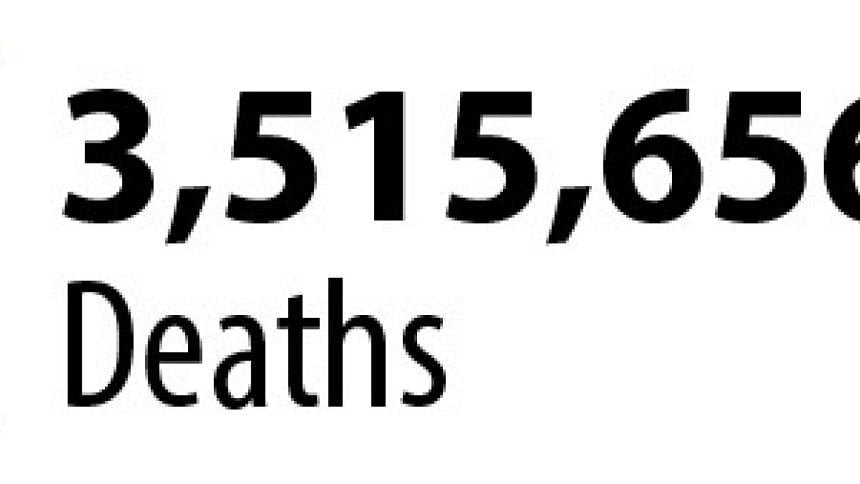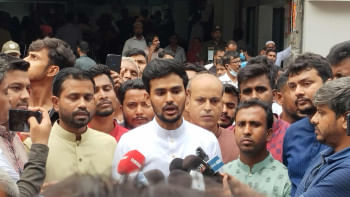Origins of Covid-19: Biden orders new probe

China hit out at the "dark history" of the US intelligence community yesterday, after President Joe Biden ordered a probe into the Covid-19 origins which threatens to set the course for relations between world's top economies.
Washington is reviewing its diplomatic position with China on issues spanning trade, technological supremacy and rights, while it steps up efforts to hook Western democracies into a united diplomatic front against perceived Chinese aggression.
President Biden on Wednesday reopened a barely healed sore between the countries by ordering US intelligence agencies to report to him within 90 days on whether the Covid-19 virus first emerged in China from an animal source or from a laboratory accident.
The lab-leak theory, initially trotted out by Trump then dismissed as "highly unlikely" by a delayed World Health Organization mission to China, has resurfaced in recent days, driven by Washington.
China is intensely sensitive to allegations it could have done more to stop the spread of a pandemic that has gone on to kill well over 3.4 million people and has eviscerated economies since emerging in the central Chinese city of Wuhan in late 2019.
Beijing rejects the theory the virus may have emerged from a virology lab in Wuhan and has instead accused the US of peddling "conspiracies" and politicising the pandemic.
The Biden administration's "motive and purposes are clear", Zhao Lijian a ministry of foreign affairs spokesman said yesterday, rejecting the need for a new investigation into the pandemic.
"The dark history of the US intelligence community has long been known to the world," he added, referring to the US' unfounded allegations of weapons of mass destruction which led to its invasion of Iraq.
Reviving the lab leak theory "is disrespectful to science... and also a disruption to the global fight against the pandemic", Zhao said.
But the idea of virus release from a Wuhan lab is gaining increasing traction in the United States.
Citing a US intelligence report, The Wall Street Journal reported Sunday that a trio from the Wuhan Institute of Virology were hospitalised with a seasonal illness in November 2019, a month before Beijing disclosed the existence of a mysterious pneumonia outbreak.
The natural origin hypothesis -- backed as the most likely by the WHO expert team who visited China -- holds that the virus emerged in bats then passed to humans, likely via an intermediary species.
This theory was widely accepted at the start of the pandemic, but as time has worn on, scientists have not found a virus in either bats or another animal that matches the genetic signature of SARS-CoV-2.
INDIA-SECOND WAVE
The pandemic has killed at least 3,500,321 people worldwide since the virus first emerged in December 2019, according to an AFP compilation of official data yesterday.
India's health ministry yesterday reported a steady decline in new Covid-19 cases has been recorded for the last 20 days, with 24 states witnessing a dip in active cases since the last week.
It also noted that the country is on a downswing of the second wave of Covid-19. "We are on a downswing of the second wave of Covid-19 and believe that it will be sustained even when restrictions are significantly relaxed," the ministry said.
The ministry also said that while Covid-19 testing has increased manifold, a steady decline in weekly Covid-19 positivity rate has been seen since the last three weeks.
On possible adverse effects of taking the second dose of a different Covid vaccine, it said, "If second dose of a different Covid vaccine is taken, any significant adverse effect is unlikely, but we need more scrutiny and understanding in this regard."
India reported 211,298 new infections yesterday, still the world's highest daily rise, but nearly half the daily infections it recorded earlier this month.
The government scrapped local trials for "well-established" foreign coronavirus vaccines as it tries to accelerate the vaccination rollout to counter the world's worst surge in infections.
Only about 3% of the country's 1.3 billion people have been fully vaccinated, the lowest rate among the 10 countries with the most cases, reports Reuters.
Yesterday's move will allow imports of shots developed by Pfizer, Johnson & Johnson and Moderna with which India has been in talks with little success.
Meanwhile, West Bengal Chief Minister Mamata Banerjee yesterday announced extension of the Covid-related restrictions in the state till June 15.


 For all latest news, follow The Daily Star's Google News channel.
For all latest news, follow The Daily Star's Google News channel. 



Comments